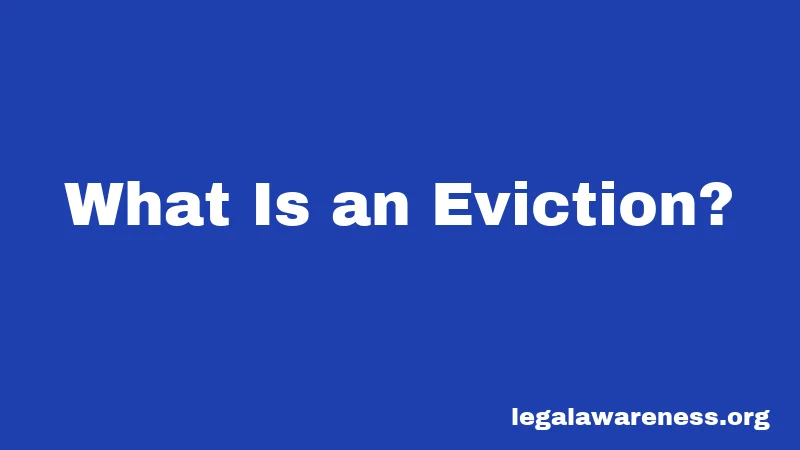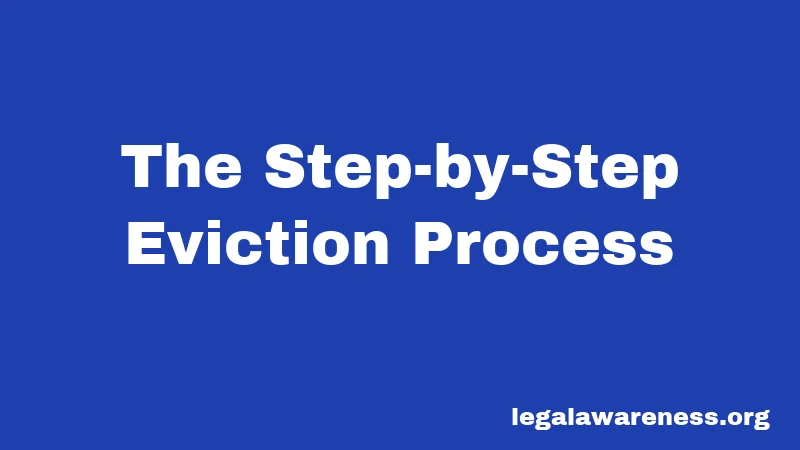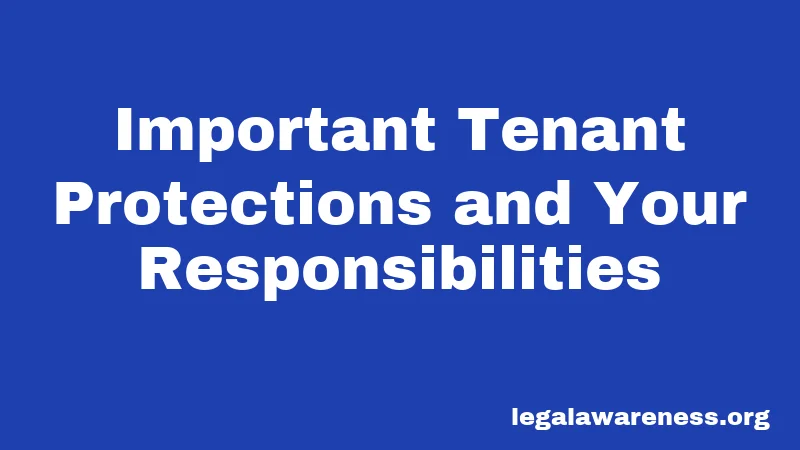Tennessee Eviction Laws (2026): The Complete Landlord & Tenant Guide
Most people have no idea how strict Tennessee’s eviction laws actually are. Seriously. But whether you’re renting an apartment in Nashville, managing a duplex in Knoxville, or dealing with a tenant situation you never expected, understanding these rules is crucial. The good news? Tennessee’s eviction process is fairly straightforward—once you know what to look for. Let’s break down exactly what you need to know.
The state follows the Uniform Residential Landlord and Tenant Act (URLTA), which gives clear rules for both landlords and tenants. But here’s the thing: you have to follow every single rule, or the whole eviction might not hold up in court. That’s why we’re walking through this together.
What Is an Eviction?

An eviction is when a landlord goes to court to legally remove a tenant from their rental property. Think of it like a traffic ticket, but with much bigger consequences. You can’t just change the locks, shut off utilities, or throw someone’s stuff outside. Only law enforcement can physically remove a tenant. Everything has to go through the court system.
The key point? You must have a lawful reason (what the law calls “just cause”). You can’t evict someone just because you feel like it or because you want to raise the rent on them. There has to be a real violation.
The Main Reasons You Can Evict Someone
Let’s talk about when Tennessee law actually lets you evict a tenant.
Nonpayment of Rent
Rent is usually late in Tennessee five days past the due date. So if rent is due on the 20th, you get until the 25th to pay it. Not the 21st—the 25th. That’s Tennessee’s grace period.
Once rent is late, you must give the tenant a 14-Day Notice to Pay or Quit. This is a written notice telling them they have 14 days to pay everything they owe, or they have to move out. Here’s what actually happens: a lot of tenants pay up once they see official paperwork. The process stops there, and they keep their home.
If they don’t pay within 14 days? Then you can file for eviction in court. Wondering what happens if they ignore the notice? You move forward with a lawsuit. The court gets involved, and things get more formal.
Lease Violations
When a tenant breaks the rules in the lease, you can start eviction. Examples include unauthorized pets, subletting without permission, excessive noise, or damaging the property. You must give them a 14-Day Notice to Comply or Quit.
This notice tells them what they did wrong and gives them 14 days to fix it. If they cure the problem (like getting rid of the pet), the eviction stops. But if they don’t fix it in 14 days? You can file for eviction.
Here’s where it gets interesting: if they violate the same rule again within six months, you don’t have to give them another chance to fix it. You can go straight to eviction.
Criminal or Illegal Activity
Tenants using the property for illegal purposes is serious business. We’re talking about drug manufacturing, running an unlicensed gambling operation, stealing, or anything violent that threatens safety. You give a 3-Day Notice to Quit. That’s it. No opportunity to fix it.
Judges take these cases seriously because they threaten the whole neighborhood. If you see evidence of illegal activity, document everything: police reports, photos, witness statements. Then act fast.
Month-to-Month Tenancies
Running out of patience with a month-to-month tenant who isn’t breaking any rules? You can end the tenancy with a 30-Day Notice to Quit. This notice must specify the exact date the tenancy ends. If they don’t leave by that date, you can file for eviction.
Okay, pause. Read this carefully: you don’t need a reason to evict someone on a month-to-month lease. You just need to follow the notice requirement. The law assumes someone staying without a fixed term can be asked to leave with proper notice.
The Step-by-Step Eviction Process

So here’s where it gets real. Let’s walk through what actually happens.
Step One: Serve the Right Notice
The first step is always the same: give your tenant proper written notice. The type of notice depends on why you’re evicting. That notice must be delivered in one of these ways: personal delivery to the tenant, certified mail (with return receipt requested), or posting on the property (which requires the sheriff to do it, and you have to mail a copy too).
Don’t skip this step. Trust me. Landlords lose evictions because they didn’t serve notice properly. Keep proof that you served it—receipts, mail confirmations, affidavits. These matter.
Step Two: Tenant Doesn’t Comply
The notice period passes. Your tenant either doesn’t pay, doesn’t fix the violation, or doesn’t move out. At this point, you can file an eviction lawsuit (called an “unlawful detainer” action) with the court.
Step Three: Court Filing
You file the unlawful detainer complaint with your local courthouse. You’ll need to include the lease agreement, proof of the violation, and proof you served the notice. There are filing fees (typically $50-$150, depending on your county), and you might need a constable or process server to handle official paperwork delivery.
Step Four: Court Hearing
The court schedules a hearing, usually within one to three weeks. Both you and the tenant can present your side. The tenant might argue the notice was improper, or they might have a valid defense like retaliation or discrimination.
Here’s what happens next: if you win, the judge issues a judgment for possession. The tenant usually gets a few days to leave voluntarily. If they don’t, you move to the final step.
Step Five: Writ of Possession and Removal
You request a Writ of Possession from the court. A sheriff or constable then serves this writ on the tenant, giving them a deadline to vacate. Only law enforcement can physically remove someone. You absolutely cannot do it yourself.
The whole process typically takes 4 to 8 weeks, though contested cases can take longer.
Recent Changes: What’s New in 2025?
Tennessee made a significant update in 2025 that affects commercial properties. Senate Bill 0292 (SB 0292), which became effective July 1, 2025, created a faster eviction process for commercial property owners dealing with squatters and unlawful occupants.
Under this new law, commercial property owners can file a complaint directly with the sheriff, who then serves a notice to vacate within 24 to 72 hours. This bypasses the traditional eviction timeline. For residential tenants, though, the regular process still applies.
What does this mean for you? If you manage commercial real estate in Tennessee and deal with unauthorized occupants, you now have a quicker legal tool.
Important Tenant Protections and Your Responsibilities

Hold on, this part is important. Even though Tennessee gives landlords clear eviction rights, tenants have important protections too. You need to know these because violating them can get your eviction thrown out or even expose you to legal consequences.
Retaliation Is Illegal
You cannot evict someone for reporting unsafe conditions, requesting repairs, or asserting their legal rights. If a tenant reports a code violation to the health department on Monday, and you serve eviction notice on Tuesday, the court will definitely notice that timing.
The law protects tenants who report violations in good faith. If the timing looks suspicious, courts take a closer look.
Discrimination Is Against the Law
Evicting someone based on race, color, religion, national origin, disability, familial status, or sex is illegal under fair housing laws. This applies at both the state and federal level. Don’t even think about it.
Proper Notice Is Required
You must serve notice the correct way and give the exact timeframe the law requires. Serving a 14-day notice verbally doesn’t count. Posting it on the back door doesn’t work. You need written notice, properly delivered.
No Self-Help Evictions
Changing locks, shutting off utilities, removing doors or windows, or throwing out someone’s belongings? That’s illegal self-help eviction, and it’s considered disorderly conduct. You cannot do any of this, no matter how frustrated you are.
Practical Tips for Landlords
You’re probably thinking: “Okay, I get the process. How do I actually make this work?”
Document Everything
Keep detailed rent ledgers showing when payments were made or missed. Take photos of damage. Save copies of every written notice. Keep emails, texts, and written communication. Why? Because courts need evidence. “I know they didn’t pay” isn’t evidence. Ledgers, cancelled checks, and official notices are.
Many evictions fall apart because landlords didn’t keep receipts or documentation. Don’t be that person.
Serve Notice Early
Don’t wait until the very last moment. If rent is due on the 20th, plan to serve notice on the 26th (after the grace period ends). This gives you time to file if needed and prevents miscommunication.
Use a Third Party for Service
It’s better to have a sheriff, constable, or process server deliver notices. Why? It’s official. It’s documented. It eliminates disputes about whether the tenant actually received the notice. Plus, it avoids awkward confrontations.
Follow the Law Exactly
This cannot be overstated. Follow every single rule. Use the correct notice period. Serve it the right way. File with the correct language. Attend the hearing. Courts are picky about procedure, and missing one step can tank your whole case.
Penalties and Fines: What Happens When Rules Are Broken?
If you break Tennessee’s eviction laws, there are real consequences.
Wrongful Eviction
If you evict someone illegally—without proper notice, for an illegal reason, or through self-help—the tenant can sue you. You could be liable for damages, attorney’s fees, and sometimes even punitive damages. Courts don’t mess around with unlawful evictions.
Landlord Liability
If you change locks, shut off utilities, or remove windows or doors to force someone out, you’re breaking the law. The tenant can report you, and you could face criminal charges for disorderly conduct. You’re also exposing yourself to a civil lawsuit.
Retaliation Penalties
If you evict someone in retaliation for asserting legal rights, the court will dismiss your eviction. The tenant gets to stay. Plus, they can sue you for damages.
Think of wrongful eviction like a traffic ticket, but more serious. It costs money, time, and your credibility.
Special Circumstances: When Things Get Complicated
What If the Tenant Claims Habitability Issues?
Not sure what counts as a habitability problem? Tennessee requires landlords to provide a habitable dwelling. This means basic systems work: heating, air conditioning (where applicable), running water, sewage, electricity, and a clean, safe structure.
If the toilet doesn’t work and you won’t fix it, your tenant might have a legal defense against eviction for nonpayment. The court might say, “Pay reduced rent until it’s fixed” or even dismiss your case.
Can You Evict During Winter?
Tennessee doesn’t have a “winter eviction ban” like some states, but courts sometimes look skeptically at evictions that would leave someone homeless in freezing weather. It’s not illegal, but it’s worth knowing the climate might factor into a judge’s decision.
What About Lease Renewal?
If you choose not to renew a fixed-term lease (like a one-year lease), you don’t technically need to give written notice—unless the lease specifically requires it. When the lease ends, it ends. The tenant has to leave by that date.
Personally, I think it’s clearer to give written notice anyway. It prevents disputes.
How to Stay Compliant: Your Action Plan
Actually following these laws means doing a few things consistently.
Create a Clear Lease Agreement
Your lease should clearly outline rent amount, due date, grace period (if any), late fees, prohibited activities, and maintenance responsibilities. Both you and the tenant should sign it. This document becomes your roadmap if you ever need to evict.
Establish a Rent Payment System
Make it easy for tenants to pay on time. Offer multiple payment methods. Send reminders before the due date. When rent is paid, document it. When it’s late, document that too.
Communicate in Writing
If a problem develops, put it in writing. Send a text, email, or letter explaining the issue. Keep copies. Verbal warnings don’t hold up in court.
Address Problems Quickly
The moment you spot a lease violation or missed rent payment, address it. Waiting gives tenants an excuse: “I didn’t know it was that serious” or “You never told me.”
Consult a Lawyer if You’re Uncertain
Before you serve any notice, if you’re not 100% sure you’re doing it right, talk to a lawyer. A small legal consultation ($200-$400) beats losing a $10,000+ case because you missed one procedural step.
Frequently Asked Questions
Can I evict someone for nonpayment of rent without going to court?
No. Tennessee requires landlords to go through court. Any eviction without court approval is an illegal self-help eviction. The tenant can sue you.
How long do I have to return a security deposit?
Within 30 days of the tenant indicating they’re moving out, you must return the deposit (minus any legitimate deductions for damage or unpaid rent). Return it to the address they provide.
What if a tenant breaks their lease early?
They’re still responsible for rent through the lease term. You can pursue eviction, and you’re entitled to collect unpaid rent. You’re also obligated to try to re-rent the unit (mitigate damages).
Can I raise rent as retaliation for a tenant reporting problems?
No. That’s illegal retaliation. Tennessee law protects tenants who report code violations, safety hazards, or maintenance issues in good faith.
What’s the difference between a notice to pay and a notice to quit?
A “notice to pay or quit” gives the tenant a chance to fix the problem (like paying rent). A “notice to quit” gives them a deadline to leave. The notice type depends on the violation.
Final Thoughts
Tennessee’s eviction laws exist for a reason: to balance landlord rights with tenant protections. Understanding them keeps you out of court disputes and protects your property legally.
Here’s the bottom line: follow the rules exactly. Serve proper notice. Document everything. Go through court. Wait for the legal process. Don’t take shortcuts. Landlords who follow these steps rarely end up in legal trouble.
Tenants, know your rights. Illegal evictions happen, and the law protects you if they do.
When in doubt, contact a lawyer or your local legal aid office. It’s worth the cost to do it right.
References
- Tennessee Uniform Residential Landlord and Tenant Act – Tenn. Code Ann. §§ 66-28-101 through 66-28-521
- Tennessee Senate Bill 0292 (SB 0292) and House Bill 0216 (HB 0216) – Public Chapter 90 (Effective July 1, 2025)
- Tennessee Department of Commerce and Insurance – Renter Resources
- Tennessee Eviction Laws: 2025 Step by Step Process & Costs – Hemlane
- Legal Aid Society of Tennessee – Tenant Rights Fact Sheets
- Tennessee Alliance for Legal Services
